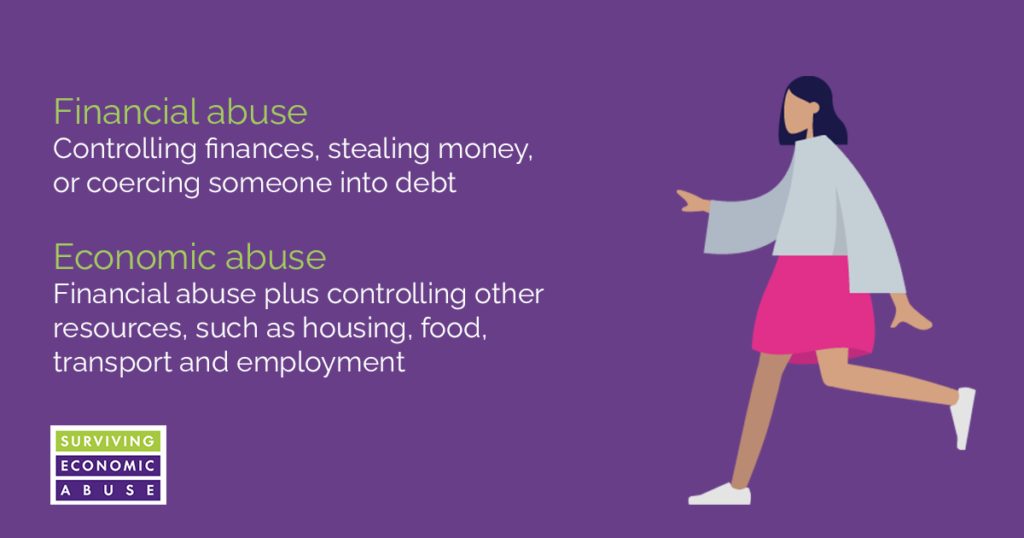Economic abuse is a legally recognised form of domestic abuse and is defined in the Domestic Abuse Act. It often occurs in the context of intimate partner violence, and involves the control of a partner or ex-partner’s money and finances, as well as the things that money can buy.
Economic abuse can include exerting control over income, spending, bank accounts, bills and borrowing. It can also include controlling access to and use of things like transport and technology, which allow us to work and stay connected, as well as property and daily essentials like food and clothing. It can include destroying items and refusing to contribute to household costs.
This type of abuse is a form of coercive and controlling behaviour. It can continue long after a leaving and can have lifelong effects.
The impact of economic abuse
Economic abuse rarely happens in isolation and usually occurs alongside other forms of abuse, including physical, sexual and psychological abuse. 95% of cases of domestic abuse involve economic abuse.
This type of abuse is designed to create economic instability and/or make one partner economically dependent, which limits their freedom. Without access to money and the things that money can buy, it is difficult to leave an abuser and access safety. Someone experiencing this type of abuse can become trapped in a relationship with the abuser, unable to resist the abuser’s control and at risk of further harm. In this way, economic safety underpins physical safety.
The impact of economic abuse makes rebuilding lives challenging. Many women leave with nothing — having no money even for essentials — and have to start again from scratch. Many victim-survivors leave with large amounts of debt and poor credit ratings, affecting their long-term economic stability, and many are unable to maintain savings that provide economic security.
Identifying economic abuse
Economic abuse can take many forms. An abuser might do any of the following:
Sabotage your income and access to money:
- prevent you from being in education or employment
- limit your working hours
- take your pay
- refuse to let you claim benefits
- take children’s savings or birthday money
- refuse to let you access a bank account
Restrict how you use money and the things that you own:
- control when and how money is spent
- dictate what you can buy
- make you ask for money or provide an allowance
- check your receipts
- make you keep a spending diary
- make you justify every purchase made
- control the use of property, such as a mobile phone or car
- insist all economic assets (eg savings, house) are in their name
- keep financial information secret
Exploit your economic situation:
- steal your money or property
- cause damage to your property
- refuse to contribute to household costs
- spend money needed for household items and bills
- misuse money in joint bank accounts
- insist all bills, credit cards and loans are in your name and make you pay them
- build up debt in your name, sometimes without your knowledge
See SEA’s Economic Abuse Wheel more information on the ways in which an abuser might exert economic power and control.
Financial abuse vs. economic abuse
Economic abuse and financial abuse involve similar behaviours, but it can be helpful to think of financial abuse as a subcategory of economic abuse. Economic abuse encompasses the many ways that an abuser may control someone’s economic situation, including employment and housing, for example.

Getting support
If you have experienced economic abuse, you are not alone. There are people and organisations that can help. We have information on support that is available. If you are a professional looking for more information, we also have resources for professionals in various sectors.

